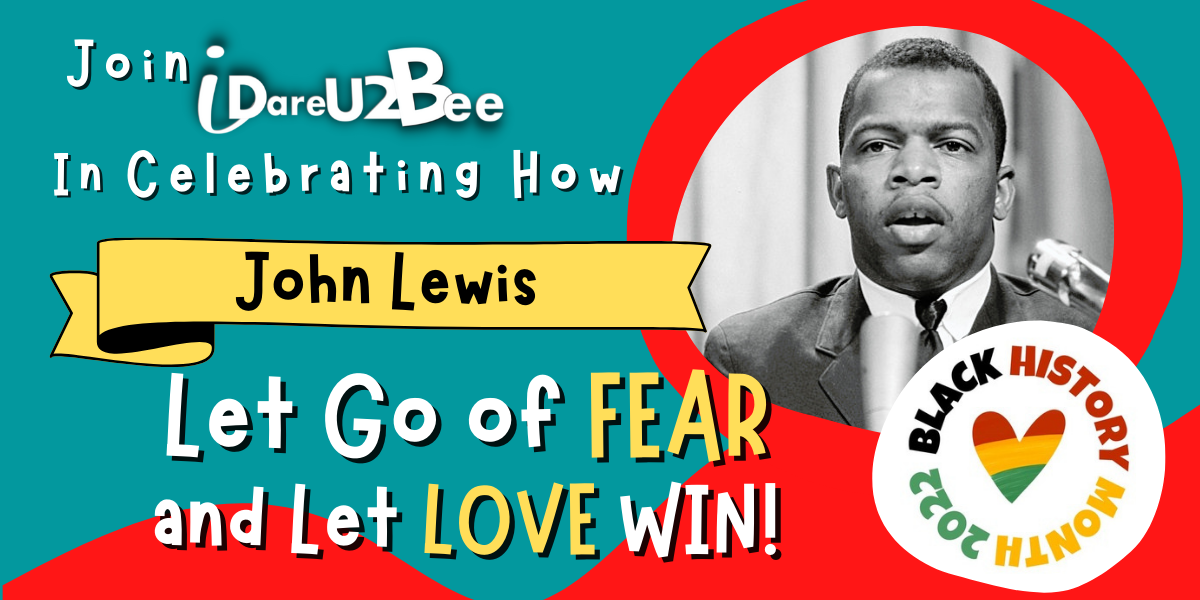John Lewis (1940-2020)
John Robert Lewis was an integral part of helping to dismantle the system of legalized racial segregation in the United States, and his commitment to public service continued as he served at various levels of government starting in 1977 and culminating as a member of the US House of Representatives for more than 30 years. As we celebrate the achievements of African American Heroes, we would be remiss to not include John Lewis. We at Idareu2bee.com acknowledge and celebrate a man who lived by the principle of letting go of hate and letting love win.
John Robert Lewis was born on February 21, 1940, on a farm in rural Troy, Alabama. He grew up poor in a mainly black farming community. He had a teacher in elementary school that inspired him to read, and he became an avid reader. John would experience racism when would go to Troy with his family, and would see the signs: “White men, Colored Men, White Women, Colored Women.” He was quoted in an article for The Atlantic saying that when he asked his family about the signs, they responded by telling him: “That’s the way it is. Don’t go getting in trouble.”
When he was 15, he heard Martin Luther King Jr speak for the first time and followed the Montgomery Bus Boycott closely. At 18, although he was attending a small historically black college in Nashville, he wrote to Martin Luther King Jr about being denied entrance to Troy University and was invited to meet MLK in person. When John entered the room, he was nervous and MLK asked “Is this the boy from Troy?” This would become the nickname for John Lewis that MLK would continue to use! They discussed the possibility of suing the University for discrimination but after some consideration, John decided not to pursue that for fear of violence against his family and continued his studies in Nashville.
In Nashville, John became involved in student activism. He participated in the Nashville Sit-In Movement which organized several sit-ins at lunch counters and was integral in the desegregation of businesses in the downtown area. He was arrested and beaten numerous times for his activism, but he considered it “good trouble, necessary trouble.” It was while attending the university that he learned the philosophy of nonviolence. He studied it and lived by its guiding principles for the rest of his life. He graduated and became an ordained Baptist Minister, fulfilling a dream he had since he was a child preaching to the chickens on his farm.1
At the age of 21, in 1961, John Lewis became one of the original 13 Freedom Riders. The Freedom Riders’ goal was to travel by bus from Washington DC to New Orleans to bring attention to the Federal Government that the South was not adhering to the Supreme Court ruling that segregated interstate transportation was unconstitutional. They were met along the way in the southern states by angry, white mobs. Yet after each violent incident, the freedom fighters would regroup and continue their mission. They had committed to themselves that they wouldn’t let violence stop them from achieving their goals.
In 1963, as the chairman of the Student Nonviolent Coordinating Committee, John Lewis was the youngest of the six organizers of the March on Washington with Dr. Martin Luther King Jr. He spoke in Washington right before Dr. King gave his famous “I Have a Dream” speech.
On March 7th, 1965, John Lewis led a group of 600 peaceful protestors in Selma, Alabama across the Edmund Pettus Bridge, a march supporting voting rights for African Americans that was meant to go all the way to the Capitol Building in Montgomery, Alabama. However, they were met on the other side of the bridge by State Troopers urging them to disperse, instead, they stopped to pray. It was then that the police unleashed tear gas, firehoses, attack dogs on the protestors. The mounted police rode into a group of demonstrators attacking them with their nightsticks. John Lewis was hit over the head by a mounted police officer with such force that it fractured his skull. He was carried back over the bridge to the church serving as protest headquarters. The violence perpetrated on peaceful black demonstrators was never captured by television crews like this and the video footage was broadcast in prime time to 50 million Americans later that night. What was happening in the south was shocking to many in the north and it galvanized the country to support the civil rights movement. This incident became known as “Bloody Sunday” and was instrumental in causing the Voting Rights Act to be passed into law on August 6th, 1965.
Throughout his career, John Lewis was a community organizer, a voting rights advocate, he worked to combat poverty and inequality. After his first unsuccessful bid for Congress in 1977, he was appointed by President Jimmy Carter as associate director of ACTION which was the federal government’s volunteer agency. After experiencing the bureaucracy of the government firsthand, he decided to resign so that he could move back to Atlanta and focus on his political career. He wanted to be seated on the other side of the table, being able to direct focus and resources on the issues that mattered to him. He was elected to congress in 1986 where he served for more than 30 years until his death of pancreatic cancer in 2020. Throughout his tenure in Congress, he continued to practice nonviolent activism for a variety of causes including ending apartheid, immigration rights, gun control legislation, 2SLGBTQ+ rights.
John Lewis once famously said: “You are a light. You are the light. Never let anyone — any person or any force — dampen, dim or diminish your light … Release the need to hate, to harbour division, and the enticement of revenge. Release all bitterness. Hold only love, only peace in your heart, knowing that the battle of good to overcome evil is already won.”
He was the embodiment of that light and we, at idareu2bee.com, salute him for being an inspiration, a fearless leader and a shining example of what one person can do when they Let Go of Fear and Let Love Win.
Sources –
- Banks, Adelle M. (July 18, 2020). “Died: John Lewis, Preaching Politician and Civil Rights Leader”. Christianity Today(obituary). Religion News Service.








